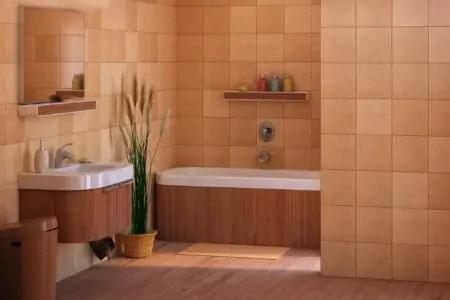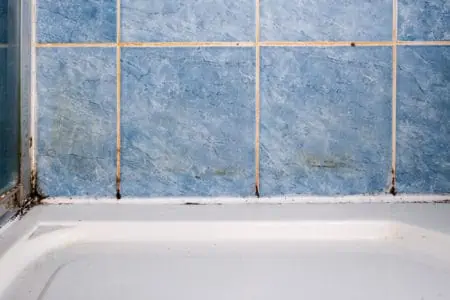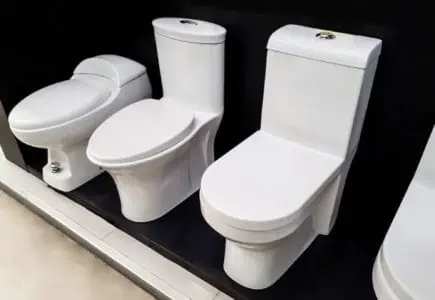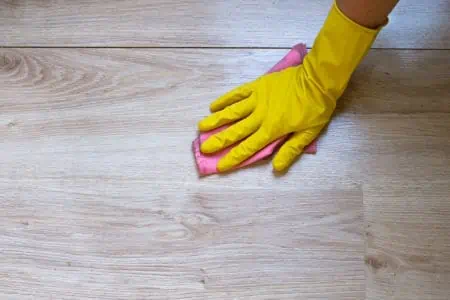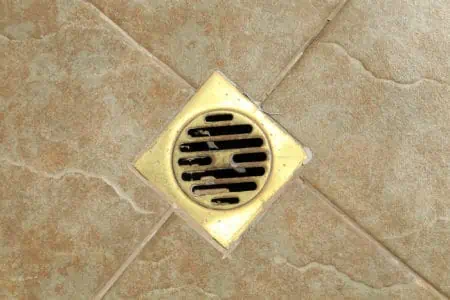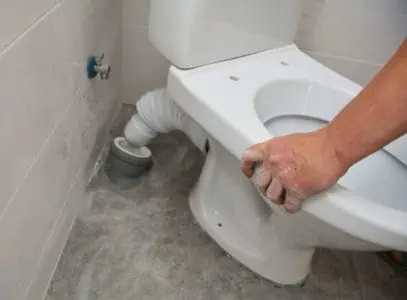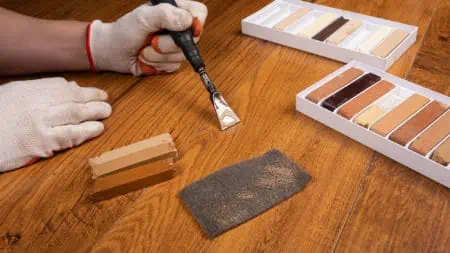Wood was once a commonly used and readily available building material, but it is more of a luxury today because of cost. If you can’t use the real thing, you could always try wood-look bathroom tiles. A wood-look tile gives the same opulent feel as natural wood but is easier to work with because it doesn’t rot.
Wood bathroom tiles and wood shower tiles are as popular as ever, so we decided to look at inspirational wood tile ideas for your bathroom.
Key Takeaways
- Wood-look bathroom tiles offer the appearance of natural wood grain while being more resistant to moisture and rot.
- Popular wood tile ideas include herringbone, palette grids, and parquet patterns for bathroom floors.
- Combine wood tiles with stone or other materials for a visually interesting design in bathroom walls and shower areas.
- For small bathrooms, use lighter color wood tiles and clever lighting to make the space feel larger and brighter.
Can You Put Wood Tiles in a Bathroom?
You can put wood tiles in a bathroom, especially in the drier areas and on the floor, but it is not recommended. Natural wood floors are popular, and many people choose to install them in their homes because of their hardwood qualities.
However, bathrooms are generally damp spaces, and wood reacts badly to moisture, so treat the wood with a suitable varnish to protect it.
A much easier option is to install wood-effect tiles made of ceramic and porcelain. They have the appearance of natural wood grain and yet withstand everything your bathroom throws at them.
24 Wood Tile Ideas
With so many options to choose from, it can be confusing knowing where to start. To make life easier, we have broken our wood tile ideas into categories. That way, you can focus on what’s essential for your bathroom plans.
Bathroom Floor Wood Tile Ideas
Your bathroom floor gets subjected to high levels of moisture, so it has to be able to repel water and still enable you to move about without slipping. Luckily, there are several options available that will allow your creative side to run riot.
1. Get Herringbone Happy
Herringbone is a popular design option for bathroom floors because it is visually stunning. The most popular types of materials include engineered wood, laminates, or parquet.
You could also use wood-look tiles to create a herringbone pattern because they cope much better in damp environments. And because tiles can be printed in almost any design, you can experiment with rustic effects or weathered wood.
2. Perfect Palette Grids
Try coupling muted tones on the walls and cabinets with a grid-effect wood tile if you want to make a design statement. Arrange them in alternating grids to mimic wooden palettes or garden decking.
Palette grids come in all colors and textures to match all tastes. Wood plank gives a rustic feel, while dark wood adds a sense of intimacy and coziness.
If you have a small bathroom, consider white wood because it reflects the maximum amount of natural light, making the room appear more spacious.
3. Delightful Decking
Why not bring that outside decking effect inside your bathroom? It creates a rustic feel but adds warmth and texture. And the great news is wooden plank-effect tiles come in almost every shade you can think of.
It also creates the illusion that your bathroom is longer or wider depending on how you lay them, making them a great option for smaller spaces.
4. Parquet Perfection
Parquet flooring is a throwback to bygone days when it was a popular flooring choice. It would have been hardwood back then, but today, you can get engineered parquet flooring, laminate, and porcelain tiles.
This image shows a classic grid pattern with diagonal inlays to create different designs. Parquet works just as well in larger bathrooms and smaller spaces.
5. It’s Good To Go Gray
Sometimes wood tiles need to emulate real wood rather than fool the eye into thinking they are real. Lighter colors like gray, coupled with a wood grain finish, adds a stylish element to your bathroom and can look just as good on the walls and floor.
Brighter tiles help to distribute the light more effectively, making them an excellent fit for small bathrooms.
6. Uncoordinated Colors
One way to mix it up and create individual designs is to opt for a mixture of tile grains and colors. This floor comprises two or three different shades and grains, yet it works to create an interesting pattern on the floor.
We all like to think logically, but sometimes to do what feels unnatural delivers the best results.
7. Bed and Bath United
When the master bedroom and bathroom need styling, the best advice is to use the same flooring for both rooms. It links them and makes the ensuite seem larger than it actually is by tricking the eye.
Top Tip
If you are using a hardwood floor, use wood tiles in the dampest areas around the shower stall and bathtub.
8. Divide and Conquer
One of the easiest ways to break up the space in your bathroom is to use different materials to denote other areas of the room. Wood effect tiles in the shower stall and toilet surround can define that space.
In this bathroom, you can see that the wood tile is broken up by the marble tiles surrounding the freestanding bathtub.
Bathroom Wall Wood Tile Ideas
Your bathroom walls should be water-resistant and easy to clean. They should also offer different textures and shades to indulge your creative streak. Wood-effect tiles come in all shapes, sizes, and shades.
9. The Prince of Paneling
To create that colonial look of the early settlers, look no further than actual wood paneling. A half-paneled wall finished in classic whitewash establishes the feel of a country-chic bathroom and reflects light.
Use The Correct Wood
Medium density fiberboard (MDF) will not stand up to moisture. And always use a marine-grade varnish to protect the wood from rotting in damp conditions.
10. Stone for Tone
Mixing stone veneers or stone effect tiles with a classic wood-look tile is an intelligent way to introduce a contrast in textures. The stone enhances the wood, and the wood complements the stone. You can also use the different materials to denote bathroom areas like the washbasin and shower stall.
11. Bask in Brown
You can see in this image, they have used a lighter floor to accentuate the browns in the wood-effect tiling on the walls.
Using muted tones like brown and natural wood colors creates a warm and inviting space. Matching rustic colors on the walls with a wood effect floor increases the overall effect.
To Keep In Mind
Be careful that the color scheme doesn’t darken the space, especially in smaller bathrooms. It can look a little overpowering and may need some balance with lighter colors.
12. Faux Wood
You can see from this faux wood that even up close, you would struggle to tell the difference. Even the touch of this porcelain tile feels like the real deal.
It has a weathered look that gives your bathroom a lived-in feel. It may not be to everyone’s taste, but it certainly packs a style punch.
13. Wonderful Wooden Walls
Wooden walls are impractical in a bathroom because they trap moisture, but cutting the wood-look tiles in longer planks gives the effect of real wood. Thanks to their size, tiling the bathroom is quicker, and it uses less grout, so the chances of mold growth are reduced.
This light wood effect brightens the room because it helps to reflect natural light. If you have a smaller bathroom, going for a lighter color tile is a better option.
14. Gain With Wood Grain
Adding specific wood grain-effect tiles to the bathroom scheme breaks up slabs of block colors and adds different accents to the design. Placing them above bathtubs as splashbacks or in shower stalls completes the look.
Style Tip
Try adding real wooden furniture like rattan chairs and dark wood bath mats to accentuate the wood grain tiles.
15. Wood Look Bathroom Tile
While it may depart from wood-effect tiles, you can use natural wood to frame your tiles and provide a luxurious feel. Here you can see that the inclusion of a distressed vanity cupboard with a designer washbasin lifts the overall scheme.
The classic combination of marble and wood complements the design and provides darker accent colors to show off the luster of the tiles.
Small Bathroom Wood Tile Ideas
If your bathroom is small, you need to get creative to make the space feel larger. You can do this using lighter colors, clever flooring solutions, and enhanced light reflection. The more the natural light floods the room, the larger it will feel.
16. More Shine is Fine
The addition of shiny tiled surfaces bouncing natural light into the bathroom makes smaller spaces seem larger and brighter and adds a touch of glamor. Combining wood-look tiles and accents of dark wood and black wood helps to balance the light with shade.
Take Note
Shiny surfaces need more cleaning because they show up smears and scuffs.
17. Combine Wood and Tile
Combining wood and tile creates different moods within the same space. While this is highlighted in the spacious bathroom above, it can also be a classic combination for small bathrooms.
Another stylish trick is to use accent lighting, recessed in the ceiling or around fixtures, to frame the space and provide low lighting.
18. Master Bathroom
When it comes to the master bathroom, you can really splash out and create that luxurious haven you’ve always dreamt about. This ensuite uses designer basins and faucets to create a stylish interior, framed by blue wood-look tiles on the walls.
The freestanding-effect counter is finished in dark wood to add that accent of luxury.
19. Tile and Stone
Combining tile with stone creates a warm environment packed with texture and luxury. The natural light picks out the surface pattern of the tiles, creating interesting shadows. This design incorporates the classic herringbone pattern on the walls to contrast with the gray wood effect shower tiles.
20. Let There be Light
Nothing quite matches mood lighting for that extra luxury. Many wood-effect tiles have textured surfaces that mimic wood, and the correct lighting can pick out interesting details to create the mood.
Rather than going for a central bulb, try adding light to a mirror, as in the picture, or position recessed lighting inside a shower stall. And if you use darker wood-look tiles, it makes the whole space feel cozy, which is ideal for smaller bathrooms.
21. Keep Colors Simple
While it might be exciting to mix the media, keeping uniform colors can make the smallest bathrooms seem a lot more spacious. Here, the cabinets are one block of color and contrast nicely against the lighter tiled splashback behind the his-and-hers sink.
For tiny bathrooms, using white wood tiles and cream paint helps fill the room with light, and unlike other styles, it is less likely to age.
Shower Wood Tile Ideas
Your shower stall gets the most punishment from moisture and humidity. That’s why choosing a material that can cope is crucial if you want to avoid mold and mildew. Wood tiles are excellent at repelling water, and the textures and shades add a touch of class to the shower.
22. Shower Panels
Shower panels are easy to install and completely water-resistant. They come in either complete units or slot together in three or five panels. They mimic wood, tile, marble, and many other textures and materials.
They can also be cut to size to fit your bathtub as a splashback.
23. Wood Shower Tiles
Using wood-look tiles in the shower stall is a great way to bring texture and tone to your bathroom, and it is also easy to maintain. Tiles are water-resistant, so they will fight the growth of mold and mildew.
You can see from this shower stall that they have used light gray wood to create texture without darkening the space.
Good To Know
Grout absorbs moisture, and that’s where fungal growth usually starts. To minimize the risks, use larger tiles to reduce the amount of grout inside the enclosure.
24. Timber Touches
The expression ‘less is more’ is certainly true when you use wood-look tile sparingly in your shower enclosure. This shower has a feature wall that provides a darker focus to accentuate the shinier walls that surround the enclosure.
Keep In Mind
Using too much brown wood makes the shower too dark and lessens the impact against the lighter surfaces.
Wood Tile FAQs
Why Fake Is Better
It’s one of the few times when we would recommend using something other than natural wood. Ceramic and porcelain wood bathroom tiles look like the real thing and even mimic the same texture!
They come in every color, texture, and shade possible to satisfy your creative urges when it comes to your bespoke bathroom design. So what are you waiting for? Go for it and have some fun.
